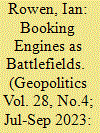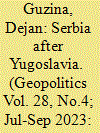|
|
|
Sort Order |
|
|
|
Items / Page
|
|
|
|
|
|
|
| Srl | Item |
| 1 |
ID:
191657


|
|
|
|
|
| Summary/Abstract |
Travel booking engines can produce, resist, and destabilise popular and state-directed geopolitical representations of a world neatly divided into national and international space. Although they present as strictly functional technical platforms, booking engines obscure and omit what is contingent and contested in the production of a destination as a bordered national territory. Due to their embedding in the webs of political representation, these systems and their backers can become targets for economic boycotts, political threats, hacks, or other interventions when territorial designations are contested. Such interventions manifest as political performances aimed at multiple audiences, including tourists and travellers, as well as the businesses and political entities that facilitate or inhibit their circulation, with spillover effects into other domains of geopolitical representation. To empirically illustrate this argument, the paper analyzes the People’s Republic of China’s mostly successful efforts to coerce the international travel industry to relist destinations within Taiwan as belonging to China. By extending the notion of border performativity into the ‘code/spaces’ that span the online and offline worlds, it concludes that booking engines, like other forms of infrastructure that serve travellers and tourists, can produce popular geopolitical effects that exceed their own technical systems. Peering through these ruptures reveals the uneasy and unstable assemblages of travel infrastructure and territorial representation that regulate global mobility.
|
|
|
|
|
|
|
|
|
|
|
|
|
|
|
|
| 2 |
ID:
191659


|
|
|
|
|
| Summary/Abstract |
In this paper, we reveal three classes of asylum seeker sentiment in the Australian population. The first group are pro-asylum seekers who think Australians should help refugees, that government agencies should not be turning back boats carrying people seeking asylum, that immigration levels are low, and that current government policy is too tough. The second group are anti-asylum seekers who strongly disagree with helping refugees and people seeking asylum, and support a tough border policy. A third group are pro-government policy but largely sympathetic to refugees and people seeking asylum. We explain the demography and attitudes of these three groups using the theory on border securitisation. The securitisation actions and discourse position people seeking asylum as a threat. This has received widespread public endorsement. This is an empirical reflection of over two decades of influential Australian government discourse of antipathy towards refugees and asylum seekers. Successive Australian governments have tied those seeking asylum who arrive by boat with strict border enforcement policies that target people seeking asylum as a security threat to be repelled from the Australian mainland. This largely negative discourse has supported the merits of tough border controls. However, this discursive campaign has not entirely eradicated sympathy towards refugees and asylum seekers.
|
|
|
|
|
|
|
|
|
|
|
|
|
|
|
|
| 3 |
ID:
191654


|
|
|
|
|
| Summary/Abstract |
This paper conducts a discourse analysis of Chinese tourist writings about Africa on the most popular Chinese online tourist forum, Mafengwo (hornet’s nest). By examining 2,950 travelogues collected online, our research finds that Chinese tourists’ conceptions of Africa are mainly built through 5 frames, including the exotic frame, the adventurous frame, the poverty frame, the China’s engagement frame, and the affection frame that describe Africa as a remote, exotic, adventurous, dangerous, miserable, and backward place compared to a modern China that strongly supports Africa’s development. Much tourist writing corresponds with the official Chinese geopolitical narrative of China-Africa relations that perceives China itself as a peacefully rising power who would also like to help developing others like Africa. However, we also find that some Chinese tourists’ descriptions of Africa fit uneasily into the official Chinese geopolitical conceptions, in which they demonstrate affection for Africa, but only in regard to its Western aspects, e.g., architecture, food, activities. One contribution of this study is providing a bottom-up Chinese citizenry discourses and cultural experiences of Africa, and with this empirical analysis it updates theories of everyday Chinese geopolitics of tourism. We think this study is unique in that we have broadened the understanding of both official and citizenry Chinese geopolitical conceptions and their (dis)connections, in particular from the everyday encounter between geopolitics and tourism, which also sets a frame for comprehending Chinese citizenry geopolitical conceptions of the outside ‘other’.
|
|
|
|
|
|
|
|
|
|
|
|
|
|
|
|
| 4 |
ID:
191653


|
|
|
|
|
| Summary/Abstract |
This introduction to the special section focuses on the geopolitical relevance of tourism in the Indo-Pacific region. We first review the literature on everyday geopolitics, or Popular Geopolitics 2.0, elaborating the trend of attention to tourism activities in political geography. We then turn to tourism studies and find the divergence and convergence between these literatures. Finally, we argue that a focus on the Indo-Pacific offers new points of purchase for critical scholars reassessing the geopolitics of tourism. This introduction sets a scene for the other articles in this special section, calling for a re-thinking of the links between tourism and geopolitics from a more inclusive perspective that goes beyond Euro(American)centrism.
|
|
|
|
|
|
|
|
|
|
|
|
|
|
|
|
| 5 |
ID:
191656


|
|
|
|
|
| Summary/Abstract |
This study interrogates the geopolitical nature of China’s Xisha tourism, and unravels the territorial politics played out in tourism, while examining the complex interplay between tourism and territorialisation. It demonstrates that Xisha tourism is inherently geopolitical and integral to China’s comprehensive territorialisation strategy in the South China Sea (SCS). It reveals that Xisha tourism is politically oriented, highly regimented, and performatively constituted. Tourism and territorialisation are found to be mutually constituted and interdependent. The main argument of this study is that tourism should be conceptualised as a constitutive dimension of geopolitical restructuring processes in the SCS, and an essential part of the performative and discursive assemblage that sustains the state’s will to claim territorial possession of the SCS.
|
|
|
|
|
|
|
|
|
|
|
|
|
|
|
|
| 6 |
ID:
191660


|
|
|
|
|
| Summary/Abstract |
More than 25 years after Dayton Peace Accords (DPA), the shadows of the Yugoslav and of the subsequent construction of independent states based on ethnic division still looms over Bosnia & Hercegovina (BiH), its population, and the everyday life of people. The construction of its two major political entities – the Federation of Bosnia & Hercegovina (FBiH) and the Republika Srpska (RS) – is reflected in the health care system where it unfolds highly detrimental effects. Here, we can witness the severe impact on BiH’s ability to establish an effective system for organ donation and transplantation. Based on a series of 26 interviews with patients, patients’ organisations, clinicians and politicians BiH and its neighbours, the article identifies obstacles in clinical practices, post-Dayton bureaucracy as well as mistrust and corruption as major themes articulated by our respondents, ultimately imprisoning them in a Post-Dayton paralysis. Desperation amid the deadlocked structural conditions and contemplating alternatives ways of getting access to transplantation seem logical outcomes of a system widely regarded as deficient. This exemplifies the prosaic legacies of wars and the fragile state of BiH’s politico-administrative system.
|
|
|
|
|
|
|
|
|
|
|
|
|
|
|
|
| 7 |
ID:
191655


|
|
|
|
|
| Summary/Abstract |
Prior to 7 December 1941, Pearl Harbor was perhaps best known for its associations with the Hawaiian Shark Goddess, its pearl-producing oysters and as a strategically important US naval base. It was not until 1962, some twenty years after its attack during World War II, that it emerged as a place of heritage, when the USS Arizona Memorial was first opened to the public. Transformed from a place of war to a place of heritage and finally into a prepared touristic experience, Pearl Harbor today transmits, absorbs and constructs a range of personal and nationally based meanings about the past. It thus provides a vivid case study through which to interrogate the construction of heritage in a politically charged, contested and institutionally mediated environment. Drawing on the reflexive responses of 73 visitors, collected through in-depth, onsite interviews with domestic tourists, the paper unfolds around two key themes: (1) the varied ways in which visitors come to terms with a ‘dark’ national past; and (2) the affective entanglements that emerge from such efforts and concomitant attempts to understand their visit as a performance of national identity.
|
|
|
|
|
|
|
|
|
|
|
|
|
|
|
|
| 8 |
ID:
191658


|
|
|
|
|
| Summary/Abstract |
This article examines the role of pipelines and power lines in the (re)construction of regional energy order in Central Asia. By structuring and governing social relations across space, infrastructures are integral to region building. In Central Asia, despite the post-Soviet transition, Soviet infrastructures have perpetuated Russian control over regional energy exports, hampered Central Asian states’ development and caused regional tension. China’s construction of pipelines and power lines represented a renegotiation of spatial, economic and political relations in the region. By connecting China with Central Asian states, the pipelines secured an alternative source of energy supply for Beijing, strengthened regional states’ independence from Russian influence, and embedded them in new structures of interdependent relations with the rising power. Meanwhile, by connecting local facilities and supplying energy to less developed areas, the Chinese-built pipelines and power lines enhanced Central Asian states’ capacity, promoted integration of national territories, and reduced region tension over water and energy supply. Notwithstanding these changes, Chinese-built pipelines and power lines did not overthrow the existing regional order. Rather than replacing Soviet systems, they were additions that connected with and remained embedded in the existing infrastructures.
|
|
|
|
|
|
|
|
|
|
|
|
|
|
|
|
| 9 |
ID:
191662


|
|
|
|
|
| Summary/Abstract |
Immigration governance scholars often focus on formal, national regulations and how local implementation and resistance rations access to space and resources. Research into ‘xenophobic’ exclusion across South Africa suggests recalibrating research along two spatial and temporal dimensions. First, while legal and political discourse often evoke national principles, exclusive speech and action can be highly spatialised and distinctly sub-national. Consequently, people objectively belonging to the same, excludable category (e.g., international migrants; sexual or ethnic minorities) face varied vulnerabilities corresponding to where they work or reside. Moreover, when mobilising nationalistic discourses of exclusion and belonging, sub-national actors customise and emplace them. Such co-authoring infuses them with particularistic interests and language while imposing spatial limits on their legitimacy. This in turn generates a dynamic patchwork of regulatory regimes where local variations may be more practically important than national policy. Second, the effects of co-authored exclusion are spatial, but their foundations may be temporal. South Africa’s national political project rests on forms of restorative justice: of building futures for those materially disadvantaged and disenfranchised by Apartheid’s racist machinations. For South Africans, making claims to a future in place (i.e., in the country or a given site) are predicated on one’s position in this national temporal arc. Even if apartheid disadvantaged millions across Southern African, non-citizens are historiographically excluded from these claims. Immigrants are, in effect, run out of time. By eliding shared pasts, officials and citizens deny the possibility of a spatial future shared with non-nationals. These elements help explain the popular legitimacy of anti-immigrant mobilisation and surface the multiple modes of citizenship and exclusion operating across the country. Recognising this, the article ultimately encourages scholars to re-spatialise and temporalise the study of migration governance in ways that also recognise the dialogical dimensions of bordering and emplacement.
|
|
|
|
|
|
|
|
|
|
|
|
|
|
|
|
| 10 |
ID:
191661


|
|
|
|
|
| Summary/Abstract |
Serbia’s foreign policy choices reflect a profound identity crisis. While Serbia denies the independence of Kosovo, it simultaneously pursues membership in the European Union. My approach to understanding these tensions offers an alternative to the mainstream, liberal perspective whereby Serbian foreign policy claims are reduced to purely ideological explanations, thereby, ignoring the complex interplay between social identity crisis and political processes. I evaluate this seemingly contradictory nature of Serbian foreign policy choices from a constructivist and critical geopolitical perspective by bringing to the fore the body of international relations (IR) literature on ontological security and Stefano Guzzini’s conceptualisation of the return of geopolitics in Europe. This allows for a more nuanced analysis that recognises no government would be able to establish a coherent policy unless the underlying identity crisis and foreign policy anxieties are at least mediated.
|
|
|
|
|
|
|
|
|
|
|
|
|
|
|
|
| 11 |
ID:
191663


|
|
|
|
|
| Summary/Abstract |
The COVID-19 pandemic and interventions addressing it raise important questions about human mobility that have geopolitical implications. This forum uses mobility and immobility during the pandemic as lenses onto the ways that routinised state power reacts to acute uncertainties, as well as how these reactions impact politics and societies. Specifically, we propose the concept of “shock mobility” as migratory routines radically reconfigured: emergency flights from epicentres, mass repatriations, lockdowns, quarantines. Patterns of shock mobility and immobility are not new categories of movement, but rather are significant alterations to the timing, duration, intensity, and relations among existing movements. Many of these alterations have been induced by governments’ reactions to the pandemic in both migrant-sending and receiving contexts, which can be especially consequential for migrants in and from the Global South. Our interventions explore these processes by highlighting experiences of Afghans and Kurds along Iran’s borders, Western Africans in Europe, Filipino workers, irregular Bangladeshis in Qatar, Central Americans travelling northwards via Mexico, and rural-urban migrants in India. In total, we argue that tracing shocks’ dynamics in a comparative manner provides an analytical means for assessing the long-term implications of the pandemic, building theories about how and why any particular post-crisis world emerges as it does, and paving the way for future empirical work.
|
|
|
|
|
|
|
|
|
|
|
|
|
|
|
|
|
|
|
|
|